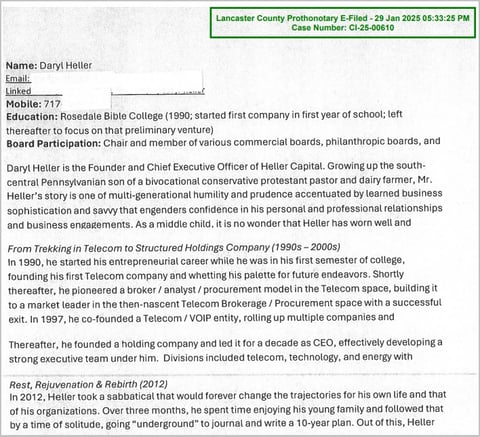Episode 6 - ATM King: Royally Screwed
Eric Warfel isn’t some clueless lender tossing money around. He’s a veteran finance executive with two decades in commercial lending: Market President, Director of Commercial Lending, and even a former bank CEO. By 2019, he pivoted to private lending, eventually landing as President and CEO of Deerfield Capital. And that’s where this story really gets interesting.
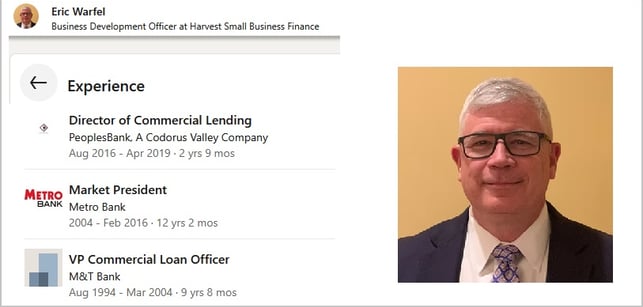

Eric Warfel - from Harvest Small Business Finance & LinkedIn
Risky Business
Let’s set the stage. It’s early April 2024, and all is not well with Daryl Fred Heller. Money is tight and he barely scraped together March’s investor payment without setting off alarm bells. Sure, it arrived a few days late according to some investors, but the delay was blamed on “processing issues,” something any business could run into.
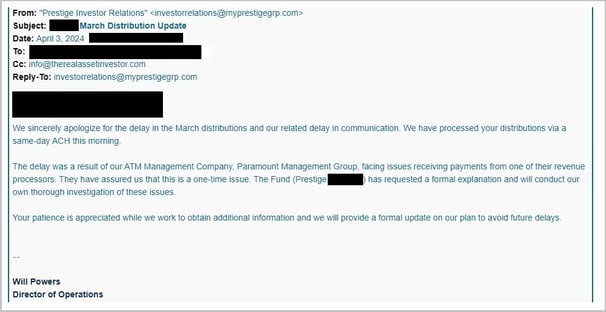

Email from Prestige to investors about late March payment
Now, as April’s $16.3 million bill loomed, the well was nearly dry. In just six months, he’s borrowed $54 million, leveraging $25 million in future ATM earnings (investor money) to keep the whole operation afloat.
A list of all defaulted loans/debts of Heller's in the six months prior to the Deerfield loan
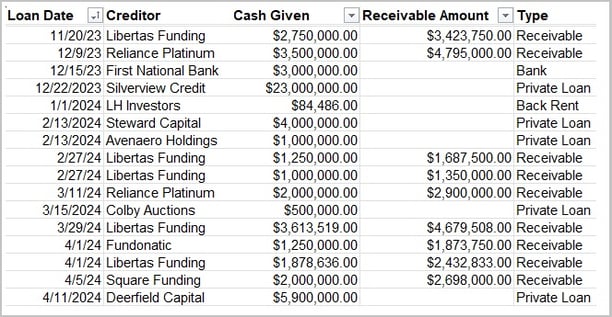

That brings us to April 11, 2024, and Heller contacts Deerfield Capital, needing nearly $6 million, fast. Just recently, he signed Promissory Notes with two local businessmen for $1.5 million. And during this time, according to Watchdog interviews, whispers of bigger financial trouble were spreading through the local banking community and interestingly, the Lancaster Country Club membership.
Why Lancaster Country Club? Because several members had reportedly invested in the ATM scheme through the influence of active member and former Club President, Jerry Hostetter – who also happened to be President of Prestige Investment Group (PIG), owned by Heller.
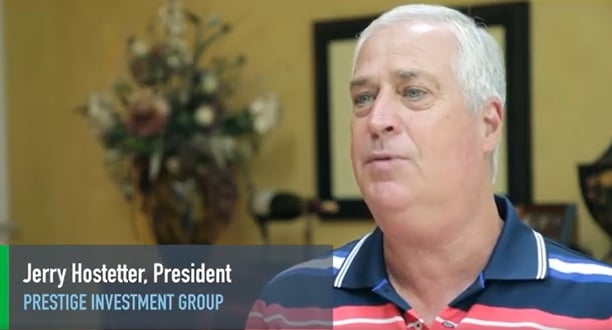

Despite it all, Heller came away with his requested $5.9 million, but at a steep price. The loan had to be repaid in just four (4) days along with an additional $800,000 interest. And if Heller defaulted on the loan, he would incur a 17% interest rate on the unpaid principal balance.
Bridge loans, in this context, are designed for desperate businesses, providing fast cash with brutal terms. The lender knows this risk and to no one’s surprise, Heller defaulted immediately. That April 15 default triggered a Membership Pledge Agreement, letting Deerfield claim ownership stakes in Heller’s numerous businesses.
And instead of calling in the debt and launching legal action, Deerfield extended multiple lifelines to Heller. Five, in fact, each one more costly than the last:
A Domino Effect of Default
April 17, 2024 – Forbearance Agreement #1: Heller bought himself time, but at a price. A $250,000 fee extended his repayment deadline to April 23, with a new balance of $6.15 million.
April 23, 2024 – Forbearance Agreement #2: The cost of delay climbed higher. This time, $500,000 was tacked onto the loan, giving Heller until May 10 to produce $6.65 million.
June 4, 2024 – Forbearance Agreement #3: By now, Heller had defaulted twice. In response, Deerfield restructured the debt again, nudging it up slightly to $6.68 million.
August 12, 2024 – Forbearance Agreement #4: Another round, another extension. The debt swelled to $6.83 million, with just two days, until August 14, to make good.
October 20, 2024 – Forbearance Agreement #5: The final lifeline. By now, the August 14 deadline had come and gone, and Deerfield was done waiting. Wrapping in all accrued fees and penalties, they set a final price tag of $8.7 million, due by October 31. If Heller didn’t pay, legal action was next.
Was this loan a lifeline or a trap?
That depends on your perspective. For Deerfield, it was a calculated move - a high-risk, high-reward deal where they either got paid or took control of Heller’s assets. For Heller, it was financial quicksand. By October 31, after months of stalling and legal maneuvering, he defaulted once again.
Maybe this wasn’t just a bad loan. Maybe it was the perfect loan—for the guy who wrote it.


After months of waiting for payments that never arrived, Warfel ramped up his efforts to recover Deerfield’s money. On December 5, 2024, Deerfield filed a Confession of Judgment for $8,708,632.81, and by December 9, they were moving to garnish accounts linked to Heller Capital across six financial institutions. Securing a court order to seize assets was the easy part, finding them would be another challenge entirely. While Deerfield hunted for Heller’s money, Heller was busy hiding it, according to complaints.
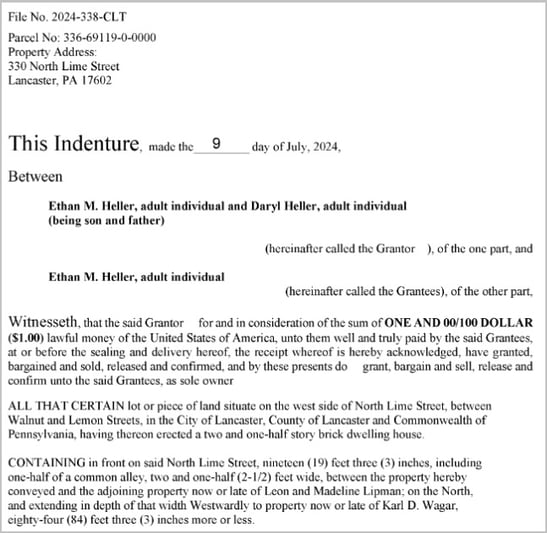

Property transfer from father to son
Smoke, Mirrors, and Metadata
Deerfield’s forensic accountants and private investigators uncovered an elaborate game of financial deception.
Heller allegedly liquidated one of his companies, Prevail Technology, and kept the cash for himself rather than repaying creditors as legally obligated.
To entice Deerfield into throwing more lifelines, Heller created falsified financial documents to show he could repay the loan. In fact, when many of the documents were forensically examined, metadata analysis revealed that Heller had generated the documents just minutes before he emailed them to Warfel.
Investigators tracked over 24 Heller-controlled entities with more than $100 million in assets, yet he refused to provide visibility into their finances.
Heller transferred real estate to his son, Ethan, for $1 while already in default on multiple loans, an act Deerfield labeled as fraudulent conveyance, a classic move to shield assets from creditors before an inevitable collapse. Daryl Heller had initially purchased the home for almost $450,000 six months prior.
On January 25, Deerfield tightened its grip, filing a motion to have the court appoint a receiver to take control of Heller Capital. The goal? To stop Heller from bleeding his businesses dry while creditors were left with nothing. If granted, the court-appointed receiver would freeze Heller’s ability to move money, untangle his financial mess, and ensure that any remaining funds went toward repaying investors and creditors rather than propping up Heller’s lifestyle.
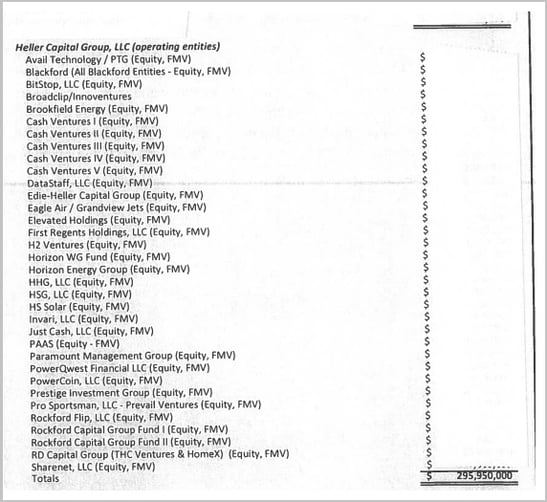

A listing of Heller's entities with potential assets for seizure
Intensifying the pressure, Deerfield launched a lawsuit against a staggering number of Heller-owned entities, including:
A Lititz restaurant that, according to 2/15/25 court records, was already facing eviction
Eagle Air/Grandview Jets LLC, where Heller had owned and sold a Cessna Citation Excel jet
Marijuana grow operations tied to his cannabis investment firms.
Dozens of ATM, real estate, and cryptocurrency holdings, scattered across various shell companies
Even Heller’s wife and children weren’t off-limits. Investigators suspected the entire family was involved in concealing assets, shifting ownership, and playing a role in shielding the Heller fortune from collection efforts.
By the end of January, the court demanded answers, ordering Heller to explain why he shouldn’t be stripped of control over his companies.
Before diving into the impending February showdown between Eric Warfel (Deerfield Capital) and Daryl Heller, let’s take a quick detour. Deerfield’s legal team submitted an exhibit titled “Daryl F Heller Personal Financial Statement” to support their request for an expedited injunction hearing. This particular gem features the life story of Daryl Heller in third-person, weaving together humble brags, financial posturing, and an image so polished you could eat off it.
According to Heller’s Personal Financial Statement, updated in December 2023, his journey began at Rosedale Bible College in 1990, where he attended for exactly one semester. With academia out of the way, he dropped out to start his first company, setting the stage for his inevitable rise. By 2012, after years of business success, he took a sabbatical, a period he described as “Rest, Rejuvenation & Rebirth.” He further described a three-month stretch in which he went underground (his words, not ours) to journal, reflect, and sketch out a 10-year master plan that would forever change his life and his organizations.
And change they did. Heller Capital grew into an empire spanning multiple industries, including his “most significant holdings” in cannabis and cryptocurrency, no doubt built on his deeply held principles of integrity and trust. Among his many ventures were Glorious Cannabis, Electraleaf, and PowerCoin, alongside ATM networks, eCommerce brands, and even a fine dining establishment. Because nothing says business sophistication like pairing crypto investments with a side of Japanese A5 Wagyu.
The Legend of Daryl Heller, by Daryl Heller
Click to open the full document - Heller's Personal Financial Statement from 2023
But Heller’s true calling extends beyond business. He presents himself as the son of a “bivocational conservative Protestant pastor and dairy farmer,” a man of “multi-generational humility and prudence accentuated by learned business sophistication and savvy.”
(Translation: He would like you to picture him as both a simple farm boy and a brilliant financial mind, depending on what serves the purpose at the moment. And didn’t he claim to be a multi-generational Mennonite?)
Mileages from Uzbekistan (the inspiration trip) to three Horizon locations


And naturally, no story would be complete without a philanthropic angle. Heller co-founded Horizon, a nonprofit operating in Kenya, Honduras, and Guatemala, dedicated to “rescuing, restoring, and empowering underprivileged children to self-sustainability.” The inspiration? A “divinely appointed humanitarian trip to Uzbekistan,” which, while certainly a unique location to find one’s life purpose, somehow led him to fund work in entirely different continents. Of course, they’ve been left high and dry like thousands of others who have had the opportunity to interact with Daryl Heller.
A multi-generational legacy of humility and prudence, indeed. Now, back to the February showdown.
By February 7, 2025, the court had seen enough and Judge Leonard G. Brown, III, took swift action. All asset transfers over $1,000 were frozen without explicit court approval, slamming the door on any last-minute attempts to move money out of reach. At the same time, Heller and his associates were ordered to turn over five years’ worth of financial records, forcing them to expose the tangled mess behind his empire.
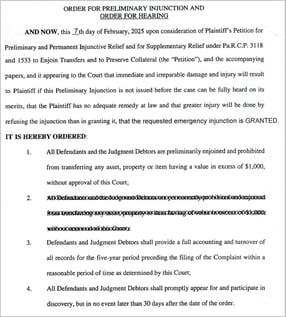

Feb. 7 preliminary injunction against Heller & companies
Is This Heller's Last Stand?
Three days later, Deerfield’s momentum came to a screeching halt. On February 10, Heller’s attorneys filed for Chapter 11 bankruptcy in the New Jersey U.S. Bankruptcy Court, a curious choice given his deep ties in Pennsylvania.
Why New Jersey? No clear answer exists, but speculation abounds. Was it an attempt to keep the news out of Lancaster County? A strategic move by attorneys more familiar with New Jersey’s bankruptcy courts? A way to burden creditors with additional legal expenses and travel costs? Whatever the reasoning, the filing threw a wrench into Deerfield’s aggressive legal pursuit.
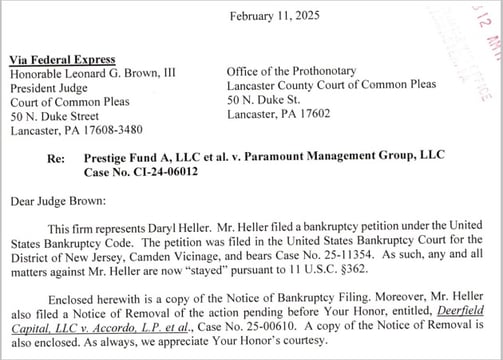

Heller bankruptcy attorneys notifying the Court of filing
Deerfield immediately moved to block it, arguing that the bankruptcy was nothing more than a stall tactic to dodge accountability and freeze collection efforts. The court seemed to share their skepticism. Heller’s legal team conveniently skipped over key financial disclosures like mandatory monthly financial statements, an oversight that wasn’t just sloppy, but suspicious. The missing information only strengthened Deerfield’s claim that this was a "bad faith bankruptcy,” a last-ditch effort to buy time and protect Heller’s own assets.
Partial response by Deerfield attorneys in response to bankruptcy. Click to open the full document.
The legal battle is far from over, but one thing is clear: Deerfield isn’t here to negotiate. The only question left: How long can Heller delay accountability?
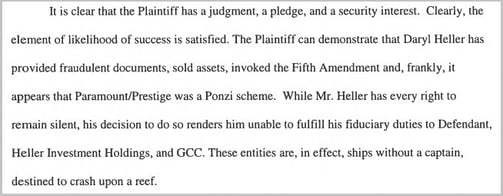

Deerfield alleging that Heller ran a Ponzi scheme
Daryl Heller Bankruptcy Hearing Information
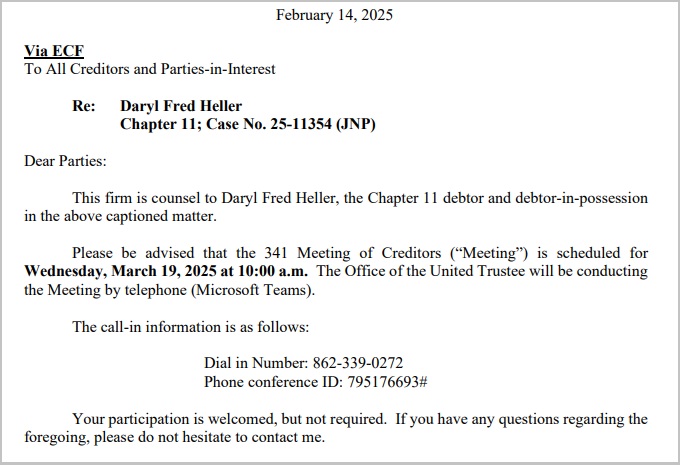

Disclaimer and other information
As these episodes pick up attention, I figured it might be best to document this disclaimer (most Watchdog articles don't get attention outside of our small town):
The author of this blog has no financial interest or investment, personal or familial connection, bone to pick, axe to grind, bellyache, personal vendetta, ulterior motive, or any other wild and/or sordid arrangement, with any of the parties identified or discussed in this series. It's simply personal intrigue at what appears to be a historical financial scandal happening right here in our local communities. I'm not a journalist, make no claims to such, and have no interest in competing with those who provide the news as a career. My goal is simply to provide the information I've compiled through news reports, court documents, social media, and personal contacts with investors in a comprehensive manner that puts all of the pieces together. There's more than just the hot local Prestige v. Paramount case - the numerous creditors filing lawsuits and dozens of our own neighbors losing jobs just before Christmas paint a picture of unbridled greed. <--- Again, you know, that's just, like, my opinion, man.
For another series of news reports, please view the many articles written by LancasterOnline reporters Dan Nephin and Chad Umble. (A paid subscription is necessary to view most articles)





